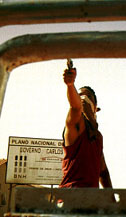
Movie Guru Rating:

Comment
on this review
| |

City of God is the hyperviolent historical gang epic to see
by Lee Gardner
First, there's the flash of a knife. As the blade slashes across the black screen again and again, the background morphs into a whetstone. A few quick and chaotic cuts later and the knife is slicing into a freshly-killed chicken as samba music plays in the background. There's a party going on in a cramped courtyard in a favela, one of Brazil's infamous ghettos. Another fowl bound for the bill of fare legs it over the mottled concrete, the viewer scurrying along via a wildly careening chicken cam. The partygoers promptly whip out pistols and give chase. Their pursuit leads the posse down winding alleys, into a wider street, and smack into a squad of police, hands on holsters. But the chicken chasers don't run; they reach for bigger guns. Caught in the imminent crossfire between the thugs and the cops are the chicken and a young Afro-Brazilian man armed only with a camera. Welcome to City of God.
All of the above action takes place in what seems like less time than it takes to read about it, by which point director Fernando Meirelles has his hooks in you. But City of God is no mere flashy shoot-'em-up. Distilled from Paulo Lins' sprawling 700-plus-page fact-based 1997 novel of the same name, the film unfolds into a panoramic triptych detailing three decades of hard and dangerous life in the notorious Rio de Janeiro favela that provided the title. City of God is, in fact, one of the most complex and compelling accounts of dead-end street culture to ever hit the big screen, and veteran commercial director Meirelles inaugurates his feature-film career with an epic worthy of mention in the same breath as The Harder They Come, Goodfellas, Boyz in the Hood, or Pulp Fiction, all of which this remarkable film brings to mind at some point.
As the young man with the camera, Rocket (Alexandre Rodrigues), stares down a bullet-riddled fate, the film executes the first of what must be a dozen narrative jukes and zooms back to the 1960s, when Rocket was a child and the City of God was the government's latest solution to housing Rio's poor. Too smart and kind-hearted to be a "hood," Rocket (whose narration binds the sprawling storylines together) watches his brother and neighborhood pals occupy themselves with increasingly daring and violent robberies. Their rebellion without a cause soon goes awry.
In the film's second section, set in the '70s, one pint-sized wannabe gangster outwits and outlasts his less ruthless peers, transforming himself into Lil' Ze (Leandro Firmino da Hora). As Rocket discovers puppy love and an interest in photography while hanging with middle-class "groovies" on Rio's paradisiacal beaches, Lil' Ze and his best friend Benny (Phellipe Haagensen) consolidate power in the favela's drug trade. But the easy-going Benny goes "groovy," buying Hang 10 shirts with his drug money and buying into the film's ultimately ironic period mantra of "peace and love." Meanwhile, the dour Ze becomes only more power-mad and sadistic; a scene in which he and his enforcers crack down on some prepubescent toughs is almost unwatchable. As in the preceding '60s section, Meirelles, co-director Katia Lund, and screenwriter Braulio Mantovani build this segment of the story to a dramatic climax while skillfully setting up the section to come.
At the dawn of the '80s, Lil' Ze finally meets his match in Knockout Ned (Seu Jorge), an upstanding regular guy, who, despite all his power and wealth, Ze envies. Ze destroys Ned's life, and Ned grudgingly allies himself with Ze's drug-trade rival, Carrot (Matheus Nachtergaele), leading to an endless gang war. Meanwhile, budding photographer Rocket snaps a picture of Ze which might provide his ticket out of the favela, provided Ze lets him live that long.
Even this relatively lengthy synopsis barely covers half of what goes on in City of God, which amasses a boggling body of characters, stories, and sociological details in just over two hours. The film even manages to find a spare moment to humanize Lil' Ze; although he wields ultimate power in the City of God, at root he too is just another poor kid cut off from what he wants and ill-equipped to handle that fact. It is also worth noting that Meirelles' outsized cast—all of whom perform well, some brilliantly—is made up almost exclusively of first-time actors straight from the streets of the favelas the story depicts.
Perhaps most impressively, Meirelles and company somehow manage to have their cake and eat it too: The film plays as both a well-meaning, indie-ish chronicle of the social ills facing downtrodden people and as a stylish, hyper-violent crime film. It does so by never blinking or flinching, never sentimentalizing. It never lectures, never offers up a tidy moral judgment, and never dresses up the naked truth that there are few happy endings for anyone in the City of God.

March 27, 2003 * Vol. 13, No. 13
© 2000 Metro Pulse
|